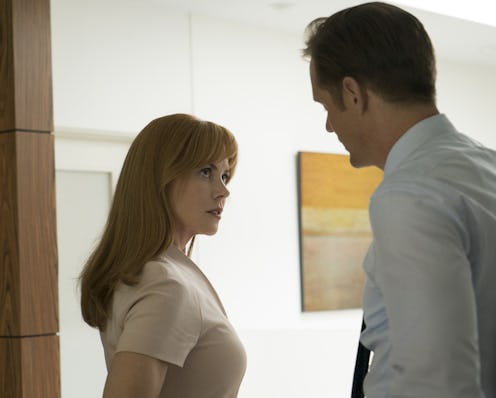Entertainment
What 'Big Little Lies' Gets Right About Abuse

A quick look at any synopsis of Big Little Lies will quickly give you the basic details on each main character — and one important thing to know about Celeste (Nicole Kidman) is that her husband abuses her in the privacy of their own home. Meanwhile, she's the envy of everyone in Monterey thanks to her lavish mansion, effortless beauty, and the husband who's oh-so charming in the presence of others. Big Little Lies' depiction of domestic violence is important for a number of reasons — first and foremost, the issue doesn't receive nearly enough representation onscreen and everyone's latest TV obsession has now become a conversation starter. But I also give Big Little Lies major credit for showing that domestic abuse doesn't always look or sound exactly as we might imagine it would.
The phrase "abused wife" tends to conjure up an image of a woman who cowers in fear and remains completely motionless when her husband hurts her. It's easy (and understandable) to assume that a domestic violence victim would never dream of saying something like, "are you going to hit me again?" as Celeste does during a tense moment with Perry in the March 12 episode "Push Comes to Shove." Those types of abuse victims absolutely exist, but so do women like Celeste — and by showing a character who sometimes hits her husband back and deliberately provokes him, viewers are challenged to look at our own preconceived notions about domestic abuse.
After looking at social media responses to the show and speaking with friends and family members, a common question people had was whether or not Celeste is in some way "complicit" in this violent marriage. Along with the reasons mentioned above, people have pointed out that the couple's sex scenes appear to be consensual and Celeste told Madeline that sometimes she thinks she "likes" fighting because it leads to sex. (It's important to remember that she was far from honest about the nature of their arguments during this conversation, and Celeste has not confided in Madeline about the abuse.)
There are a few possible explanations for why Celeste hits Perry back and seemingly picks fights with him. As Rachel Goldsmith, AVP for the Domestic Violence Shelter Programs at Safe Horizon, told Refinery29, there can be several reasons a victim fights back: "Is someone hitting back because they’re trying to defend themselves? Or do they feel like there’s consequences for not going along with the dynamics in the relationship?" With Celeste, it seems like a little bit of both. She fights back with varying degrees of success, but it's also clear that violence is a turn-on for Perry — so her quick slaps back may be an effort to stop the physical abuse because she knows he'll immediately want to have sex.
In the previously mentioned interview with Refinery29, Cameka Crawford, Chief Communications Officer for the National Domestic Violence Hotline cautioned against referring to this behavior as "mutual abuse" because domestic violence is, at its core, a matter of power imbalance in a relationship. And it's extremely clear that Celeste is afraid of her husband — viewers saw her freeze in fear when he choked her during both this and last week's episodes and she furtively glanced at Perry, as though asking permission, before answering any questions during their joint therapy session. The doctor has picked up on her fear and, when Celeste visits on her own, her assertion that, "I'm not afraid" grows more heartbreakingly unconvincing each time she repeats it.
Celeste does sometimes provoke arguments, and this behavior is better explained in the book because readers are privy to her narrative voice. In the book, she grows uneasy when Perry goes too long without a violent outburst — because she knows from experience that, when it comes, it will be more intense than usual. She explains to readers that sometimes she'll deliberately say or do something to make him snap so she can get the abuse over with and move forward to the phase where Perry is desperately contrite. It's a method of self-protection, and I hope the miniseries finds a way to convey this to viewers at some point this season.
There's no perfect, cookie-cutter response to rape, and the same applies to domestic violence victims. By showing behaviors that many people may not necessarily associate with a battered spouse, Big Little Lies challenges viewers to think a little deeper than the stereotypes we may associate with domestic abuse — and in turn it propels the conversation forward in an essential, educated way.